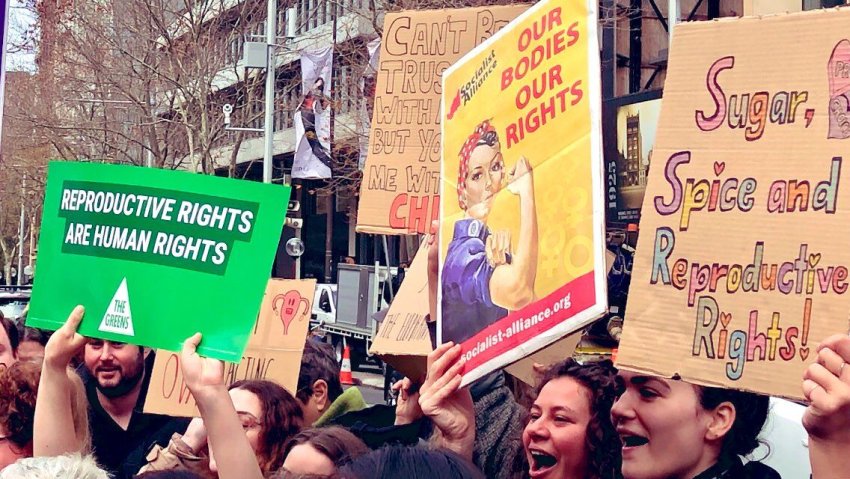
Abortion has finally been decriminalised in New South Wales, after decades of campaigning and nearly 40 hours of parliamentary “debate” that generated widespread anguish around what should be a basic health matter.
For such a broadly sponsored bill that had medical and legal backing, the fact there were more than 100, mostly anti-choice, amendments proposed was a reminder of just how powerful the unrepresentative anti-choice lobby still is in NSW.
In the end, the bill was passed by the Legislative Assembly on September 26 with no division: none of the Liberal MPs who had threatened to bring down the state Coalition government bothered to even ask for a division. Presumably, they got what they wanted.
The anti-choice MPs' tactic was to delay and obfuscate. They succeeded in passing amendments that abortion doctors say are not only unnecessary, but could make access much harder for some people.
‘Broadly workable’
James Cook University obstetrics and gynaecology professor Dr Caroline de Costa told Green Left Weekly that the 25 amendments that were passed are “broadly workable”.
De Costa said: “There’s probably no need to spell out what doctors are doing, as they already work at the highest standards. And women seeking abortions have already made up their minds. But, overall, decriminalising abortion brings it out of that grey area. It means that women will not feel threatened by a prosecution.”
Abortion provider and long-term pro-choice campaigner Dr Kamala Emanuel agrees. She told Green Left Weekly: “It’s good that women can no longer be charged for procuring an abortion, but this bill is worse than what was passed in Queensland [last year]."
Emanuel thinks that the anti-choice MPs blackmail worked.
There is no need to legislate on reporting abortions, Emanuel said. “Yes, we want the data, including postcodes, so we know how far people have to travel to access the procedure and to improve health outcomes. But it’s not necessary to pass a law for that. Just like there are regulations to report some infectious diseases, births, stillbirths and deaths, we could require abortions also be reported.
“Counting abortions to scaremonger about the number of procedures performed is not a legitimate use of the law or resources.”
Another amendment outlaws any intimidation used to force someone to have an abortion, including for the purposes of sex selection, or to not have one.
De Costa said there was “no evidence that sex selection is even happening”. She said that with non-invasive testing available, doctors would not even know if people were opting for abortions based on gender. “The statistics certainly do not show that this is a problem, but, if it was, the answer is to educate, not penalise.”
Emanuel said she is concerned that women who decide to have an abortion because of chromosomal abnormalities may face extra hurdles. “Gender-biased sex-selection abortion cannot be legislated away”, she said, adding that there is a small amount of data showing it was occurring in some communities.
“Rather, we need a society-wide discussion about the best way forward. We already know that the punitive approach does not work.”
Decriminalisation with more restrictions
Emanuel is also concerned about the new bill requiring two doctors to sign off on an abortion after 22 weeks into a pregnancy, something she believes simply adds extra hurdles to those already going through a difficult time.
Emanuel said the amendment that states a specialist medical practitioner “may ask for advice about the proposed termination from a multi-disciplinary team or hospital advisory committee” could lay the basis for a further layer of scrutiny, and another obstacle to access.
“It’s at the 18-19-week scan where a problem may show up. Even one extra requirement means more time, more money and more obstacles for the person having to make the decision, who is already in an anxious state.
“It’s bad enough that two doctors have to be consulted: that is more than today”, Emanuel said, and “adding extra layers of supervision onto those who need the procedure at 22 weeks, when they mostly did not expect to have one, is wrong. Yes, we’ve got decriminalisation, but with more restrictions on women and their doctors.”
Another controversial amendment contained in the bill is that doctors must provide care to babies “born alive” after an attempted termination.
“This is the sort of thing that comes straight from the US anti-abortion playbook”, Emanuel said. “It is being made to sound like ‘babies’ are being left to die in surgeries. The fact is that it is far better if abortions can be undertaken with minimal distress, so that this situation never arises.”
Review
Emanuel said she hoped this amendment prompts doctors to opt for better medical practices to reduce, not exacerbate, the distress.
Asked what they thought of the idea of a five-year “review” of the legislation, de Costa said she is confident that “it will show that the new law is working quite well”. Emanuel said it would give a timeframe for pro-choice advocates to continue to educate the community, reduce the stigma and push for greater access.
“Specifically, we need abortions to be done in public hospitals so that regional and rural women do not have to travel long distances, away from their family and friends, to access the healthcare they need," Emanuel said. “We need to keep up the fight too, because we’ve just been reminded that the powerful anti-abortion lobby will not give up.”